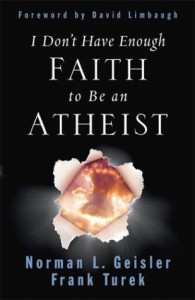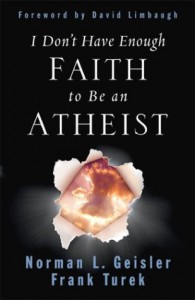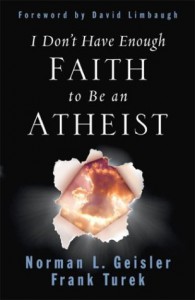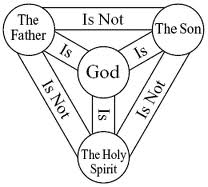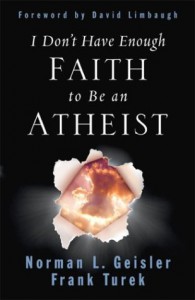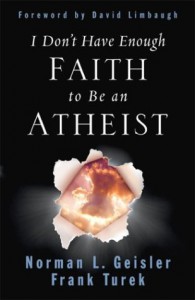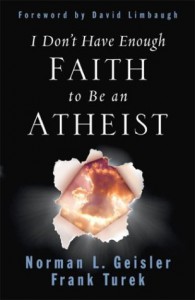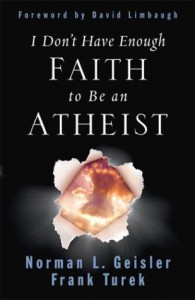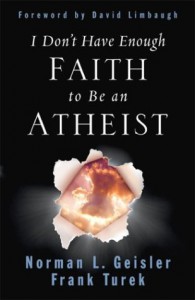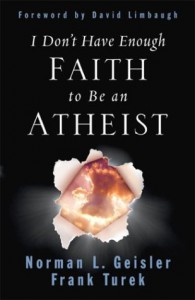January 15, 2011 02:43 AM CST
Critiquing "I Don't Have Enough Faith to Be an Atheist" (Ch4)
Welcome back. We're way off-schedule here, but still moving along. Here's what we've covered so far in Geisler and Turek's 12-point argument for Christianity:
1. Truth about reality is knowable. (Actually, we've shown it's impossible to know if this is true, but also that it doesn't matter, so Geisler and Turek are OK here.)
2. The opposite of true is false. (No argument from us.)
3. It is true the Theistic God exists, as evidenced by:
3a. the Cosmological Argument (I agree, but ironically the Bible doesn't)
Meaning today we're tackling the authors' second line of evidence for God's existence:
THE TELEOLOGICAL ARGUMENT
As Geisler and Turek tell it, the classic argument goes like this:
- Every design has a designer.
- The universe has a highly complex design.
- Therefore, the universe has a Designer.
Some might quibble with the authors' phrasing - Kyle Williams charges, "The words ‘design’ and ‘designer’ are so closely related that the first premise is a tautology, the second premise begs the question, and the conclusion, therefore, is meaningless." - but I personally think the authors' meaning is clear enough to where we can get on with it. After all, Geisler and Turek can afford to beg questions since they will be devoting the next three chapters to answering them.
Yes, you read that right: the next three chapters. Settle in, it's going to be a long one.
Though to be fair, if any subject of Christian apologetics deserves such in-depth treatment, it's undoubtedly the old T & A.
For at least two at least two big reasons:
First, if you Fundamentally believe and take literally the Bible's Creation Account (previously discussed), you can't let stand all the scientists' talk of natural forces gradually building us into the species we are today. That would invalidate part of God's Word, which would put the entirety of the Good Book in doubt. So I hear, anyway.
Second and perhaps more importantly, the Teleological Argument is vital theologically to every church save the Universalists'. Since the fact is that even if God did reveal himself through miracles to a bunch of Jews two or three years ago, He certainly hasn't revealed Himself to everybody else, it's necessary for God's existence to be evident simply from the natural order of things. Otherwise, there's no good reason for God (read: Christians) to blame them for not believing in Him. That's not a big problem for "Calvinist" Christians, who at the end of the day don't think a good reason is necessary to torture someone eternally, but it's a serious issue for the rest of us.
So there's an awful lot riding on whether Geisler and Turek can make a good case for the T.A.
Pity them for it, because there isn't one to make. The Teleological Argument, as we shall see, is flawed to its very core.
THE ANTI-THEORY
The problem with the Teleological Argument is exemplified by the modus operandi of its main defenders in the United States, American Christians who comprise the "Intelligent Design Theory" (IDT) movement. The movement's purpose - and I will try to give a neutral definition here that is nevertheless true - is to very pointedly use only scientific facts to back up its members' belief in a higher being's design of our cosmos, in hopes they can get God mentioned again in American school systems. A lot of IDT advocates believe in the Bible's account of our world's creation in seven days. Others believe God simply guided the natural processes which produced life here on Earth. Geisler and Turek's I Don't Have Enough Faith to Be an Atheist is actually a fair example of the approach, even though it doesn't exclusively deal with scientific questions.
However, since Geisler, Turek, and their fellow Christians understandably have no idea where to begin explaining the mechanics of speech-triggered omnipotent power, the practical function of their work is to be what in politics you'd call a "party of obstructionism", arguing against others' solutions while having jack-all to contribute themselves. Less than a minute of subjecting any Christian to the Socratic Method should be enough to make clear their arguments all spring from the informal logical fallacy of arguing from ignorance. In short, they represent not theory but anti-theory.
Not to put too fine a point on it, but a great illustration was brought before the Kansas Board of Education during its semi-recent trial of the IDT. Advocates of the IDT were compared to those people who once theorized that, since we didn't know how Egyptians could build the Pyramids with their primitive technology, aliens must have helped them.
As you might expect, believers in the IDT take issue with this characterization. The preeminent William Dembski claims to have "an explanatory filter" for pinpointing the fingerprints of our designer on this world - specified complexity - and IDT hero Michael J. Behe thinks he's proven, a la Sherlock Holmes, that the Theory of Intelligent Design simply must be true because nothing else can account for what he's named irreducible complexity. Geisler and Turek also raise the "Anthropic Principle" in Chapter 4. We'll give all of it a fair hearing starting with this post.
And with all this introduction out of the way, let's get to dissecting
CHAPTER 4: THE ANTHROPIC PRINCIPLE
Geisler and Turek's argument in Chapter 4 is that the Anthropic Principle proves the validity of the Teleological Argument. According to them, the Anthropic Principle is:
just a fancy title for the mounting evidence that has many scientists believing that the universe is extremely fine-tuned (designed) to support human life her on earth.
But it's actually:
the philosophical argument that observations of the physical Universe must be compatible with the conscious life that observes it.
If this doesn't strike you as a brilliant insight, I don't blame you; I'm not overly impressed either. Geisler and Turek find it revelatory, though, for just how precise conditions have to be to support the conscious life in question (namely, us). And they spend most of the chapter trying to drill into us an appreciation of same, using the famous story of the Apollo 13 crew's survival to illustrate the "anthropic constants" (conditions required for our existence - for instance, Earth's oxygen levels remaining at a steady 23%) necessary for us to live. They then climatically assert that the chance of 100+ of these conditions all simultaneously converging is virtually zero, so Someone must have planned it.
The short answer to all of the above is that it's an argument from incredulity, which is only a variation of the argument from ignorance. Christians rightly object on this same ground when atheists calculate how many religions and permutations of those religions exist or have ever existed and then jeer at the improbability of a Christian's beliefs being correct. But let's address Geisler and Turek's claim more thoroughly anyway.
There are multiple ways to do so. I might note that trying to mathematically divine the chances of highly complex events has always been bupkis, since the various factors' relations to each other not only complicate matters, but often simplify them as well. For instance, I have no idea what the likelihood is of gravity existing (nor does anyone - so we've just put paid to the whole issue right there, haven't we?), but I do know that the power of gravity makes it much more likely - even almost certain - that various materials will be pulled into orbit around larger bodies. The ramifications of other universal laws similarly preclude any conditions other than those we observe. And never mind the probability of these various principles existing in the same universe, Since we have no idea how they might relate to each other (scientists have long searched for a great "Theory of Everything" to explain it), we can't say whether or not it's improbable they're all here. Maybe they're a package deal.
I might also point out that just because it's improbable conditions have developed in a manner suitable for our kind, that does not mean other conditions would have been unsuitable for any kind. Different rules might have just resulted in different lifeforms.
Putting aside the statistical stuff, though, I think it's most important to call Geisler and Turek on how baldly they're overselling this universe's suitability for our people. The unique "anthropic constants" of Earth can be seen, in fact, as the exception that proves the rule of the cosmos's lack of consideration for us. Our home represents almost nothing of the universe's total, ever-expanding space, yet it's the only hunk of rock of which we're currently aware on which our species is capable of surviving - and even here, people seem to forget, it's been a tough road to hoe. A lot of our planet isn't inhabitable or is just barely so. When we arrived, it was also full of predators trying to eat us, and we could barely farm enough food to survive. Natural phenomena still knock down our homes and kill us by the thousand.
Earth is not the ideal homeland Geisler and Turek make it out to be. Things have only been as good as they are on this planet for a very limited time, too - a blink of an eye in geologic terms. For most of its existence, Earth has been completely uninhabitable, and forecasts are that it will be again "soon". Unless we become a space-borne people before it does, the story of our species will parallel that of the short-lived sperm whale in Douglas Adams's The Hitchhiker's Guide to the Galaxy.
Of course, it shouldn't be necessary for us to flee a planet designed expressly for us, so one should question why the Designer, if He exists, has done such a shoddy job. As Geisler and Turek are Christians, I feel comfortable their answer is that our world was designed to be perfect, but we ruined the design by sinning.
That "theory" is interesting to consider, since it reminds us of Christian theology I don't think is really heard anymore. Man clearly lacks the power to modify his world through his own choices. What agent, then, changed the earth and its inhabitants after Adam and Eve sinned? The common summation of the process is that "Sin entered the world" (from Romans 5:12), implying that "Sin" in fact a malevolent, immaterial force. Just as God warned Cain, Sin was crouching at the door, waiting for us to crack it open so it gain access to Creation and ruin everything! But no: this is just fanciful anthropomorphizing of a concept. Sin is not simply one more member of Christianity's rogues gallery.
A little more Bible reading leads us instead to the real culprit: God. His alterations to His own design are right there in Genesis 3:16-19:
To the woman he said,
“I will make your pains in childbearing very severe; with painful labor you will give birth to children. Your desire will be for your husband, and he will rule over you.”
To Adam he said, “Because you listened to your wife and ate fruit from the tree about which I commanded you, ‘You must not eat from it,’
“Cursed is the ground because of you; through painful toil you will eat food from it all the days of your life.
It will produce thorns and thistles for you, and you will eat the plants of the field. By the sweat of your brow you will eat your food until you return to the ground, since from it you were taken; for dust you are and to dust you will return.”
Not only does God clearly make it hard to earn a living on this planet in the above passage, but it can also be read as Him imposing the punishment of death on us all. This fits in with the prevalent idea of God meting out death as the going wage for sin.
If you don't agree with that interpretation, you must at least agree God indirectly kills us in the next few verses:
3:22 And the LORD God said, “The man has now become like one of us, knowing good and evil. He must not be allowed to reach out his hand and take also from the tree of life and eat, and live forever.” 23 So the LORD God banished him from the Garden of Eden to work the ground from which he had been taken.
But I am rabbit-trailing.
To review: materialist atheists believe this world is the result of impersonal cosmic phenomena, evolutionary processes, and natural selection. This is why the universe has made so little room for us and been so scandalously and unfairly brutal: it wasn't made with us in mind. What we do enjoy of it, we enjoy because we have successfully adapted to it as a species.
Au contraire, say Geisler and Turek. Quite the opposite! This planet must have been made with us in mind, since we are so improbably suited to it - and the extent to which we are clearly not suited for it simply suggests the degree to which that Designer means to make things hard for us.
I don't think there can be debate as to which of these two theories is more egocentric, but I'll leave it to you which requires more faith.
I don't really want to do that, of course, but I have no choice. I can't reach through this screen and throttle you until you pick the obvious answer.
NEXT: We can actually move right along to Chapter 5, as the remainder of Geisler and Turek's fourth chapter demands no rebuttal. The authors spend the remaining pages of it sermonizing on how contemplation of the vastness of space can help us understand, if only slightly, the majesty of God. They base this Sunday School lesson on Bible verses, even though they're still quite a few steps from proving that source's validity. If that sounds intriguing to you, you'll have to buy the book.
